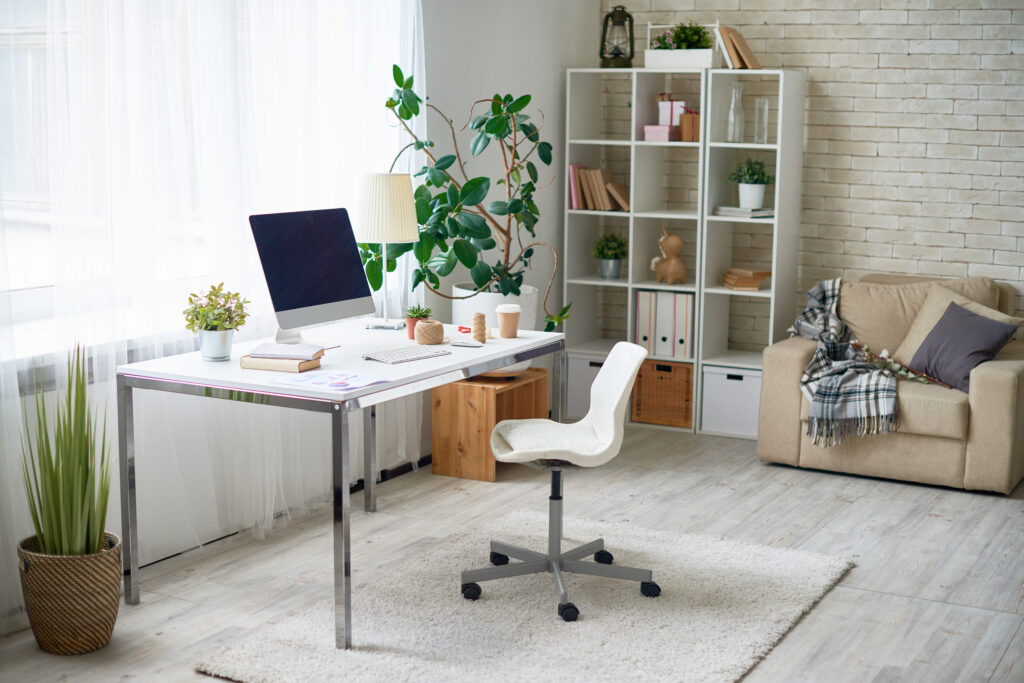Location No Longer Matters: How Remote Work is Redefining Home Search Criteria
The modern workplace is changing rapidly, with remote work becoming more and more popular. This shift has also changed the way people search for their dream homes; location is no longer a priority.
With a growing number of people working from home, buyers are now more focused on finding a home that meets their lifestyle needs than finding a home close to their workplace.
In this blog post, we’ll explore how remote work is redefining home search criteria. So read on!
The rise of remote work

Over the past decade, remote work has experienced a significant rise in popularity.
With advancements in technology and a growing desire for flexibility, more and more individuals are opting to work from the comfort of their own homes. The traditional 9-to-5 office job is no longer the norm, as employees seek a better work-life balance and companies strive to attract and retain top talent.
One of the key factors driving the rise of remote work is the increased connectivity that the internet provides. With a stable internet connection, professionals can now collaborate with colleagues, attend meetings, and access important documents from anywhere in the world. This newfound freedom has opened up endless opportunities for individuals to work remotely, whether that means working from a beachside café in Bali or a cozy cabin in the mountains.
Additionally, the COVID-19 pandemic has further accelerated the shift towards remote work. With the need for social distancing and lockdown measures, companies were forced to adapt to remote work to keep their operations running. This unforeseen circumstance served as a catalyst for many organizations to embrace remote work as a long-term solution.
The rise of remote work has not only transformed the way individuals work, but it has also had a profound impact on the real estate market. As professionals no longer need to be in close proximity to their workplace, the demand for homes in major cities has decreased, while suburban and rural areas have experienced a surge in popularity.
Homebuyers now prioritize space, amenities, and lifestyle over workplace accessibility, changing the real estate landscape.
Impact on the real estate market

The rise of remote work has had a profound impact on the real estate market.
As more and more professionals opt for the flexibility and convenience of working remotely, the demand for homes in major cities has significantly decreased. The once sought-after urban lifestyle, with its long commutes and bustling city streets, no longer holds the same appeal.
Instead, suburban and rural areas have seen a surge in popularity. Buyers are now looking for homes that offer more space, privacy, and access to nature. They want to escape the crowded city and find solace in the tranquility of the suburbs or the beauty of the countryside. This shift in home search criteria has reshaped the real estate landscape, with developers and sellers focusing more on suburban and rural properties to meet the changing demands of remote workers.
Furthermore, the decrease in demand for urban properties has also led to a drop in prices in some areas. As supply outweighs demand, sellers are forced to lower their prices to attract buyers. This presents a unique opportunity for those who have been dreaming of owning a home in the city but previously couldn’t afford it.
Overall, the impact of remote work on the real estate market cannot be overstated. It has changed the way people find their dream homes and offered up new options. It will be interesting to see how the real estate market responds to remote employees’ needs as remote employment grows.
Shift in home search criteria

As remote work continues to rise in popularity, there has been a significant shift in home search criteria.
In the past, proximity to the workplace was a top priority for many buyers. However, with the freedom that remote work offers, people are now focused on finding a home that meets their lifestyle needs.
One major change in home search criteria is the increased emphasis on home office space. As more individuals are working from home, having a dedicated workspace has become essential. Buyers are now looking for homes with an extra room or a quiet corner where they can set up their office. This shift has even led to the rise of new home designs that include built-in office spaces.
Another change is the desired location. Before, buyers would prioritize living in or near major cities for easy access to their workplaces. Now, they are looking for homes in suburban or rural areas. The appeal of escaping the crowded city and enjoying more space, privacy, and access to nature has become a top priority. Suburban and rural properties are experiencing a surge in popularity as buyers seek a more tranquil and balanced lifestyle.
In addition, the use of new technology has greatly aided remote home buying. Virtual tours and online listings have become essential tools for buyers to explore properties without physically visiting them. With the convenience of remote work, buyers can now widen their search and consider homes in different cities or even countries.
More emphasis on home office space

With the rise of remote work, there has been a significant shift in home search criteria, and one major change is the increased emphasis on home office space.
As more individuals are working from home, having a dedicated workspace has become essential. No longer is a makeshift office in the corner of the living room or kitchen table sufficient. Buyers are now actively looking for homes with an extra room or a quiet corner where they can set up their office.
The need for a dedicated workspace is not just about having a place to work; it’s also about creating a productive and comfortable environment. A well-designed home office can enhance productivity and focus, which is crucial for remote workers. Buyers are looking for homes with ample natural light, sufficient storage space, and ergonomic furniture to support their work needs.
This increased emphasis on home office space has even led to the rise of new home designs that include built-in office spaces. Developers and builders are now recognizing the demand for homes that are specifically designed to accommodate remote work. From designated home offices with built-in desks and shelving to detached structures in the backyard that serve as fully equipped offices, the options are expanding.
Buyers are also looking for homes that have good internet connectivity and access to quiet surroundings. Having a stable internet connection is vital for remote work, as it allows professionals to stay connected and productive. Additionally, a quiet and peaceful environment can help remote workers focus and avoid distractions.
As working from home becomes more common, home office space will become even more important. People will be looking for homes that will give them the best place to work so they can be productive and successful in their remote work.
Changes in the desired location

Remote work has brought about a notable transformation in the factors homebuyers consider when searching for a new property.
One of the most significant changes is the location they are seeking. In the past, buyers would prioritize living in or near major cities for easy access to their workplaces. However, with the freedom that remote work offers, people are now looking for homes in suburban or rural areas.
The appeal of escaping the crowded city and enjoying more space, privacy, and access to nature has become a top priority for buyers. The bustling city streets and long commutes no longer hold the same appeal they once did. Instead, individuals are seeking a more tranquil and balanced lifestyle.
More and more people are buying homes in the suburbs and rural areas because they want to make their ideal living setting. People who live in these areas can have bigger homes with more outdoor room and more privacy. Because it helps them focus and relax, many people who work from home value nature.
Additionally, the lower cost of living in suburban and rural areas is another driving factor in the shift in desired location. With remote work eliminating the need to live near a city center, buyers are able to find more affordable options outside of major cities.
Overall, people who want to buy a home no longer want to live close to their jobs. Instead, they want to live in a place that is quiet, has lots of space, and supports a healthy lifestyle. People who work from home have the freedom to choose where they live, and they are taking full advantage of this by moving to suburbs and rural places that offer a better quality of life.
New technology to aid in remote home buying

As remote work continues to reshape the modern workplace, it has also brought about significant advancements in technology that are revolutionizing the home buying process.
With the increasing popularity of remote work, individuals are now able to explore and purchase homes in different cities or even countries, all from the comfort of their current residence.
One of the key technological advancements aiding remote home buying is the use of virtual tours. With the convenience of technology, buyers can now explore properties without physically visiting them.
Potential buyers can see every room and feature of the house with these virtual tours, which give a 360-degree view. They can walk around the space as if they were really there, making the experience more real and immersive. Virtual tours are now an important tool for buyers, especially those who want to move to a different city or country.
Additionally, online listings have become an invaluable resource for remote home buyers. Through comprehensive online platforms and websites, buyers can access detailed information about properties, including photos, floor plans, and descriptions. They can quickly filter their search by number of bedrooms, price range, and location. Online postings make it easy for buyers to compare houses and make informed decisions.
Videoconferencing is another tool that helps people buy homes from far away. Buyers and sellers of real estate can now meet virtually to talk about homes, ask questions, and work out deals. Videoconferencing lets buyers and sellers talk to each other face-to-face, even if they are thousands of miles apart. Because buyers can talk directly to the right people through this technology, they don’t have to meet in person. This makes the home-buying process more personalized and faster.
Flexibility and freedom as top priorities

In today’s rapidly changing workplace, remote work has become the new normal.
As more and more professionals embrace the flexibility and freedom that comes with working remotely, their priorities when searching for their dream homes have also shifted. No longer tied to a specific location, buyers are now focused on finding a home that offers them the ultimate flexibility and freedom in their lifestyle.
For independent workers, freedom and flexibility have become very important. They want a home that can adapt to their changing work schedules and help them live a healthy, happy life. This means having a room that can be used as both a home office and a place to relax. People who work from home want to be able to take breaks and enjoy their surroundings; whether that means going for a walk outside or being able to work from different rooms in their own homes.
Additionally, remote workers prioritize having the freedom to choose where they live. They no longer have to be constrained by proximity to a physical workplace. Instead, they can seek out areas that offer the lifestyle they desire, whether it’s a suburban neighborhood with access to parks and trails or a rural area with breathtaking natural beauty. Remote work has opened up a world of possibilities, allowing individuals to find a home that truly aligns with their personal preferences and values.
Ready to sell your property? Give us a call today and learn more about our professional photography services that can boost your property listing!
Plus, explore our virtual assistant coaching program to level up your business. Don’t forget to tune into our new podcast for even more valuable insights!
